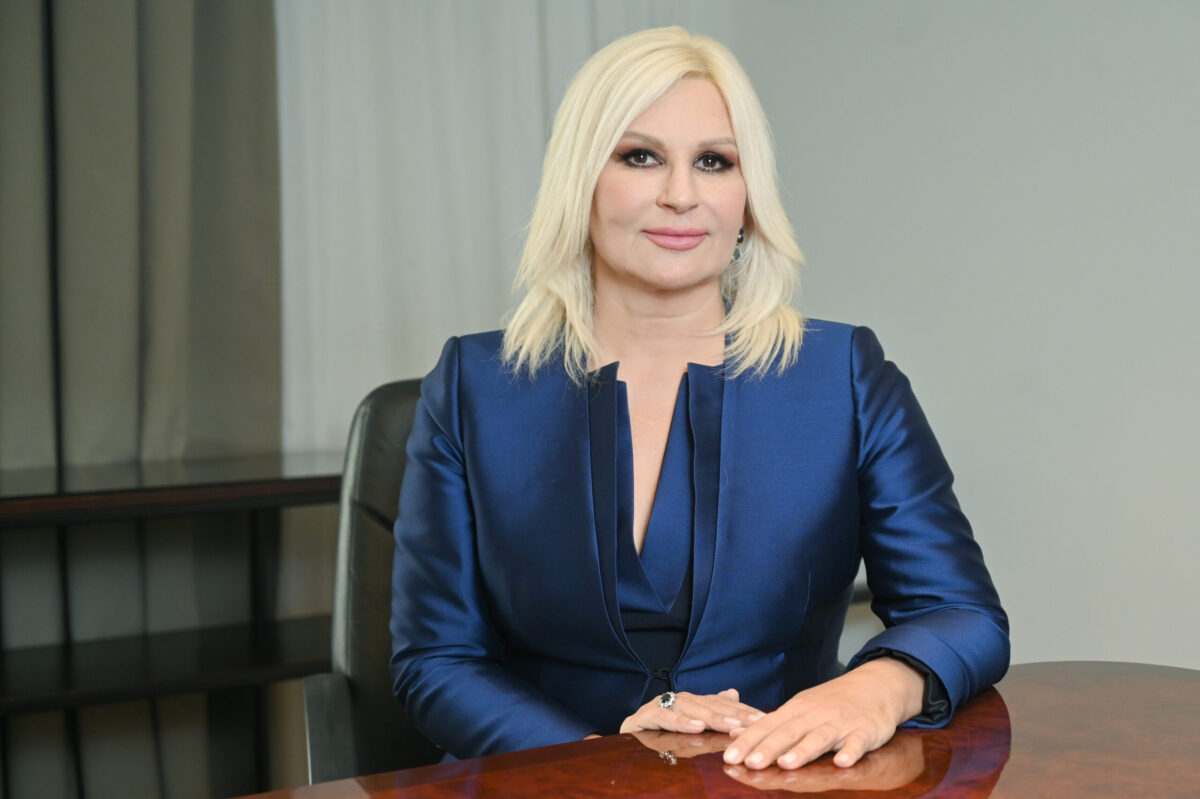Unfortunately, politicians tend to have a mindset that only stretches from one election to the next, while the energy sector requires time, decisions, and long-term investments
 Interview by: Dragan Nikolić
Interview by: Dragan Nikolić
When jadarite, a new mineral with a chemical composition very similar to the fictional kryptonite, was discovered in Serbia about twenty years ago, many were thrilled. Kryptonite, a mineral from Superman’s planet Krypton, emits radiation that can break even the strongest, but Superman can resist it due to his powers. Serbs hoped they were Supermen, but now they realize that this local “kryptonite” might more likely destroy them than strengthen them. In a conversation with Professor Dr. Zorana Z. Mihajlović, former Deputy Prime Minister and Minister, we tried to find out whether jadarite is our future or our ultimate fate.
Following the decision of the Constitutional Court to annul the decision of the Serbian Government from two years ago, which revoked the special-purpose spatial plan for the Jadar area where lithium mining was planned, it seems that Serbia is on the brink of civil war. In your opinion, what is the root of this seemingly endless problem?
Critical Mineral Resources (CMRs) are the resource base of the future for the entire world and every country. According to the International Energy Agency, global electricity demand will increase by 165% by 2050, which means a growth in production and demand for critical mineral resources like lithium, uranium, cobalt, chromium, copper, gold, antimony, and more. All responsible countries already have their strategies in this area because the development and survival of a nation depend on these resources. Serbia is the only country in the world with reserves of a single mineral, jadarite, which has been verified in the global nomenclature of new minerals. It is not pure lithium and has a unique composition compared to all other deposits in Europe or other parts of the world.
Energy and mining have never existed outside political and geopolitical frameworks. Jadarite was exploited two years ago for opposition and so-called green movements to gain prominence and enter Parliament, riding on the wave of lies and untruths. Rio Tinto has been in Serbia for 23 years, since 2001, and all governments have granted and extended its exploration rights because mineral exploration typically takes time, with lithium exploration averaging around 11 years. In December 2020, they certified a report on reserves of 158 million tons, coinciding with the year before the presidential elections. Thus, jadarite became part of the opposition’s agenda, even though they knew nothing about it, and at that time, there was no data or completed environmental impact studies. No one could have known anything about it. But when something is new and completely unknown, it becomes a haven for those who will try to profit from it, causing great harm by misleading the people of Jadar with daily apocalyptic scenarios that have no basis in truth.
Riding on that wave, the so-called greens entered Parliament, despite never having done anything in the field of environmental protection, never addressing any waste disposal sites, making plans, proposing law changes, improving anything in this area, suggesting new strategies, or attempting to tackle landfills, quarries, or ash dumps. They had all the data, especially regarding waste, landfills, and ash dumps, which claim thousands of lives annually. The division created in society, between those who are for and those who are against, has turned into political confrontations, which is wrong. This project transcends any individual and political party.
The International Energy Agency projects a further increase in lithium prices
Is there economic logic in the Jadar project, considering that our mining royalty would only be three percent, the price of lithium is drastically falling, the environmental and health risks are enormous, and this area already generates excellent income from agriculture?
The mining royalty in our country is calculated based on revenue rather than business results, so you can incur a loss and still have to pay the royalty. This project isn’t just about revenue from the mining royalty; it also presents an opportunity for the state to utilize the legal framework established in 2021 to secure an investment agreement, further ensuring not only environmental protection but also strengthening obligations in other areas. The project is much larger and has a significant impact on the overall economic development, not just for a year or two, but for the next 50 years. Moreover, the price of lithium is currently only temporarily falling; if you are well-informed, you know that prices rose significantly until 2023, after which they fell for several reasons. These include the slower-than-expected pace of the green transition, which led to a build-up of stocks, particularly of batteries, as well as geopolitical conflicts like the Russian invasion of Ukraine and the Israel-Gaza war. On the other hand, investments in the exploration and exploitation of lithium and other critical mineral resources are still growing. The International Energy Agency projects a further increase in lithium prices. Additionally, it’s worth noting that the production and prices of lithium have increased tenfold in the past 10 years compared to any other critical mineral resource. There are indeed not only economic benefits but enormous advantages for Serbia. For Serbia, jadarite is not just about mining; it involves the entire chain, including battery manufacturing and electric vehicle factories. The impact on GDP with an electric vehicle factory is 26%.
Secondly, I cannot agree with the claims about income from agriculture—it’s not accurate. If that were true, this sector would have developed in the way you’re suggesting long ago. If you read the environmental impact assessment studies, you will find a section called the baseline soil research of Jadar, which shows that the soil is contaminated with heavy metals like antimony, mercury, and titanium, far beyond safe limits. This has nothing to do with lithium but with all the activities that have taken place in this area. Interestingly, neither the locals nor various environmentalists have ever wanted to address this issue.
 If lithium is Serbia’s greatest opportunity, why are we giving it away for next to nothing and destroying our future in the process?
If lithium is Serbia’s greatest opportunity, why are we giving it away for next to nothing and destroying our future in the process?
How do you know we’re giving it away for next to nothing? Have you looked at the preliminary studies and estimates? How exactly are we destroying our future? It seems that for many, the best option is to change nothing, sit quietly, shut down everything we have, and plant flowers. But that’s not how it works; even if we don’t want to change, the world is changing.
A bit about how Rio Tinto’s journey in Serbia unfolded: they appeared here 23 years ago, conducted extensive research, and all governments and parties extended their exploration rights. They discovered jadarite, which was registered as a completely new and unique mineral in the world. It’s important to know that the mining law was changed in 2006, when Rio Tinto was already here, to automatically grant exploration rights to those conducting the research, unlike the previous 1995 law, which stipulated that after research confirmed reserves, a public call would be issued by the state to select who would carry out the exploitation under state terms. Unfortunately, they changed it in 2006. Aware of this, we changed the law in 2021, but due to acquired rights, we couldn’t revert to the provisions of the 1995 law. What we could do, we did—we introduced an Investment Agreement, through which the state tightens conditions for everything from environmental protection to infrastructure. The fact that Serbia has an entire chain not only provides economic benefits but also offers a different political and geopolitical positioning for Serbia, along with new technologies, green jobs, and all the things we currently don’t have and would struggle to achieve on our own.
How do you comment on the practical occupation of Eastern Serbia by Chinese investors? The environment is destroyed, the property of citizens and the state is owned by a foreign corporation, the laws of this country are not respected, and there are no worker rights or environmental protection.
Having specifically looked into ZiJin, for example, I can say that it’s not exactly like that. We can agree that RTB Bor barely existed, and the entire region used to live off it and develop. With the arrival of ZiJin, things have changed—the construction of a new smelter has resolved the pollution issue, and this is monitored 24/7, 365 days a year. They invested and built it. Had they not done so, Bor would still be the most polluted part of Serbia. Furthermore, the first green mine in Serbia is Čukaru Peki, in RTB Bor—digitalized and underground, so you wouldn’t know it’s a mine unless told. Serbian environmental protection laws are aligned with EU laws and standards, so they exist, and I believe they are being implemented. While I led the Ministry of Mining and Energy, we were involved in inspection work. With ZiJin, we had some fines, and they complied with everything. So, whether the investor is domestic or foreign, they behave as the state demands. Of course, I believe nothing is perfect, but I also know that the number and independence of inspectors are important because only in this way will they not hesitate to stop anything that is not by the law.
The first green mine in Serbia is Čukaru Peki, in RTB Bor—digitalized and underground, so you wouldn’t know it’s a mine unless told.
Who is responsible for this situation? Everyone blames their predecessors. What do you think, given that you’ve been with both the current and former authorities, but now you’re not aligned with either side?
Mining isn’t a short-term issue, nor is energy in general, and realistically, everyone shares some “blame,” especially regarding the enforcement of laws. Serbia has good laws, well-aligned with EU standards and legislation. The problem has always been enforcement and/or selective application. This depends on who leads the Ministry and the inspectors themselves. There are changes needed there. However, I find it hard to agree that things are the same or worse because I know how much and what we did to change things. When I came to the Ministry of Construction, Transport, and Infrastructure, there were about eight sectors, and each sector or assistant had their inspection, setting their own rules and controls, which isn’t feasible. I did as much as I could—I separated the inspections from each sector (which wasn’t readily accepted), gave them a special place in the Ministry as a distinct sector with its assistant, and granted them all the independence I could. No one ever intervened or made requests; they had freedom, and there were results. I did the same in mining and energy, from removing the assistant for mining—about whom no company or employee had anything good to say, alleging misuse of position—to forming a separate inspection sector. Unfortunately, the mentioned individual was reinstated, and the inspection work in energy and mining now doesn’t exist. That’s the issue: inspections must be independent, respected, and authoritative.
 Is there something you regret doing or not doing while you were in power that, from this perspective, you think you should have done?
Is there something you regret doing or not doing while you were in power that, from this perspective, you think you should have done?
I regret not being able to complete the documents that form the foundation of green development, namely the National Plan for Climate and Energy, which set emission limits and offered scenarios for the development of Serbia’s energy sector. The new Ministry not only increased the allowed emissions but also lacked the desire, knowledge, and energy. These are significant issues for the energy sector that require agreement from everyone. I don’t regret the energy and passion I put into making changes. I loved my job, gathered knowledgeable people rather than politically suitable ones, learned, listened to everyone, and made decisions. That’s why there were results; no one can do it alone. I believe I should have been even more aggressive regarding the reforms of public enterprises because, despite my best efforts, these enterprises were often the channels through which all that was not passed or everything that hindered the development of energy and mining on a national level.
The energy system in Serbia has been in chaos for a long time. Where is the problem?
The problem lies in the lack of strong political will because resolving and reforming Serbia’s electricity system requires serious measures that touch every part of society. The energy sector has long been controlled by tycoons who practically run it, and this was true both before and after 2000, as well as after 2012 (Hamović, Lazarević, Petrović…). Today, unqualified individuals determine what will be done, and the authorities either listen to them or work in agreement with them. The energy sector could have already been the greenest and most developed, but instead, it remains a dirty sector with outdated technologies and landfills and ash deposits that only increase the number of sick and deceased, rather than following the path it has the potential for. The reliance on shadow ministers, the employment of party loyalists, and the lack of vision or strategy—because the true strategy conflicts with other interests—are all issues, and they are compounded by the appointment of loyalists to the leadership of entities like EPS, EDS, EMS, and Srbijagas. The same goes for supervisory boards. There needs to be more expertise because, in general, experts are less likely to tolerate crime and corruption. If there were fewer people who were “bought,” things would be different, but reform of this sector needs to happen from the top down. The experts within the companies have been silenced, as was evident in December 2021 during the collapse. EPS has 6,000 engineers, and they remained silent because it was easier that way, to stay quiet with Grčić. There is no difference with the current director, as no part of the energy sector is in good condition. The construction of Block B3 in Kostolac has been going on for ten years, as if it were a spaceship. Meanwhile, having a thermal power plant with poor lignite in this day and age is not a solution.
Whether the investor is domestic or foreign, they behave as the state demands
 Why is there not more effort invested in developing healthy and sustainable energy sources in Serbia? Do we have a chance as a country and society in this area?
Why is there not more effort invested in developing healthy and sustainable energy sources in Serbia? Do we have a chance as a country and society in this area?
Unfortunately, politicians tend to have a mindset that only stretches from one election to the next, while the energy sector requires time, decisions, and long-term investments. The reform of the sector, investment in renewable energy sources, solar and wind power plants, the use of hydrogen, projects to increase energy efficiency, new reversible hydroelectric plants, and reducing greenhouse gas emissions—all of which should be imperatives—are often seen here as imposed obligations, and increasingly as conspiracies, often referred to as “green jihad.”
The future of this sector, and thus economic development, lies in moving away from dirty fossil fuels—lignite coal, gas—and simultaneously investing in hydro capacities, renewable sources like solar energy, wind, and hydrogen, as well as investing in small nuclear reactors and increasing energy efficiency. Two years ago, everything was ready for the construction of the reversible hydropower plant Đerdap 3, but nothing has come of it, just as with Bistrica and the 1-gigawatt solar power plant. Serbia has fantastic potential, but its energy sector is mired in corruption, crime, and ignorance, which prevents green energy from breaking through because when a single household installs solar panels, everything changes.
There is a draft Strategy for Energy Development that is entering public discussion, which I initiated, and is now in draft form, but it contains inaccurate data—from the capacities that can be built to the investment values—because no one cares. I would keep sending the draft back until the best version is achieved, and only then put it out for public discussion.
That’s the issue: inspections must be independent, respected, and authoritative
